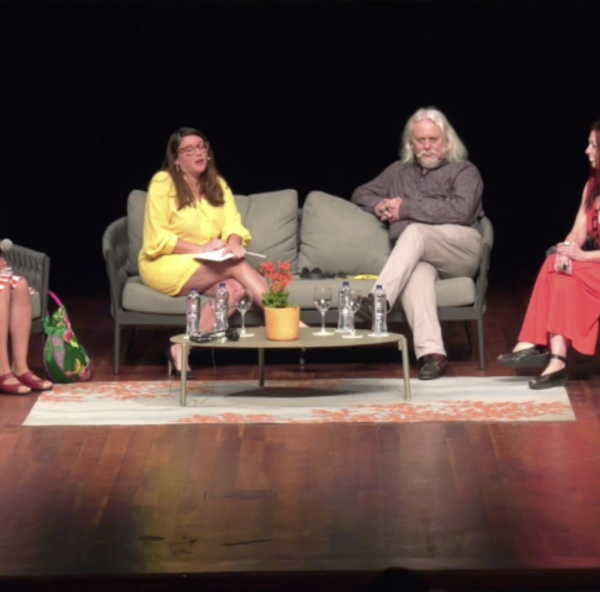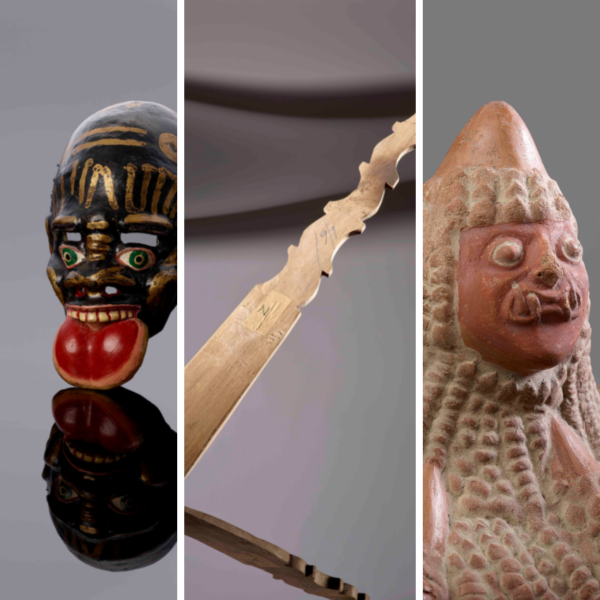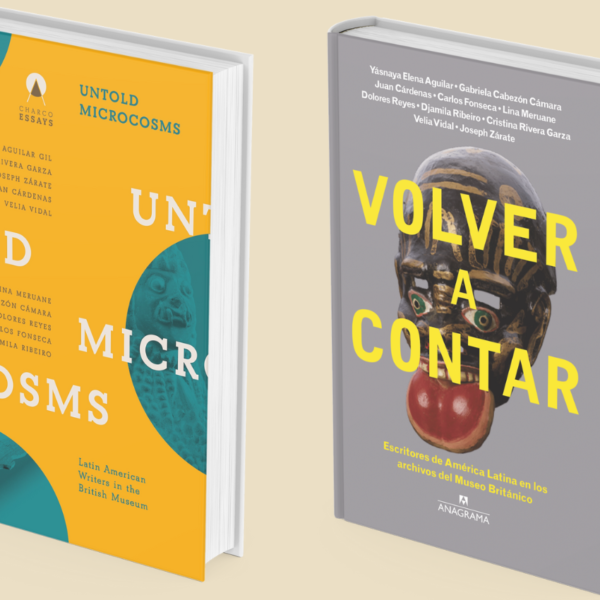Untold Microcosms: Latin American Writers in the British Museum
A new international collaboration between the SDCELAR and the Hay Festival will inspire new stories based on items from the Americas collection that are not on display in the galleries.
Ten writers will work with SDCELAR curators to write stories inspired by items in the Central and South American collection at the British Museum, to be published in September as Untold Microcosms: Latin American Writers in the British Museum by Charco Press (World English) and Anagrama (Volver a contar: Escritores de América Latina en los archivos del Museo Británico, World Spanish).
The museum’s stored collection contains approximately 62,000 objects, spanning 10,000 years of human history, and Untold Microcosms will explore the narratives about our past that we create through museum collections, in spite of their gaps and disarticulations.
Participating writers represent a snapshot of Latin America’s most inspiring storytellers, including Yásnaya Elena Aguilar, Cristina Rivera Garza, Joseph Zárate, Juan Cárdenas, Velia Vidal, Lina Meruane, Gabriela Cabezón Cámara, Dolores Reyes, Carlos Fonseca and Djamila Ribeiro, coordinated by writer and translator Sophie Hughes.
SDCELAR curators, Laura Osorio, Mercedes Martínez and Magdalena Araus, carried out research alongside these writers to create access to and provide cultural and historical context for the Museum’s collection.
“This project is about the individuals behind museum objects and their narratives, which transcend the cultural and political histories of collections. The writers involved in our project will explore relevant political contexts from the past and the present, while also reminding us to leave space in these discussions for dreams and multiplicity. Their final compositions will suggest new structures with which we can read museum objects to consider the past”. – Head of SDCELAR, Laura Osorio Sunnucks.
“Untold Microcosms invites some of the best writers from Latin America today to interrupt the profiling of cultures, making space for narratives shaped by imagination. We’re delighted to be working with SDCELAR for the first time and look forward to sharing the results with our global audience throughout 2022 and beyond with the support of Charco Press in the UK and Anagrama in the Hispanic world.”- Hay Festival international director, Cristina Fuentes la Roche.
Series of events
Hay Festival is the world’s leading festival of ideas, bringing readers and writers together in sustainable events to inspire, examine and entertain, reaching a global audience of millions each year.
The project will be further explored with live Hay Festival events around the world including Hay Festival Cartagena later this month (29 January), followed by Hay Festival in Hay-on-Wye (26 May-5 June), Hay Festival Querétaro (1-4 September), Hay Festival Segovia (15-18 September), and Hay Festival Arequipa 3-6 November), with a special event to launch the new anthology planned to take place in the British Museum later this year.
Tickets to Hay Festival Cartagena are out now at hayfestival.org/cartagena while early-bird events to Hay Festival in Hay-on-Wye are available now at hayfestival.org/wales.
The books
About the authors

Yásnaya Elena Aguilar
Yásnaya Elena Aguilar Gil (Ayutla Mixe, Mexico, 1981) is part of COLMIX, a group of young Mixe people dedicated to researching, communicating and promulgating Mixe language, history and culture. She studied Hispanic Language and Literatures and received a Masters in Linguistics at The National Autonomous University of Mexico. She has collaborated in various projects around linguistic diversity, the development of grammar content for educational materials in indigenous languages, and projects documenting languages at risk of disappearance. She has helped develop written materials in Mixe and as well as growing readerships in Mixe and other indigenous languages. As an activist she has defended the linguistic rights of speakers of indigenous languages, and the use of indigenous languages online and in literary translation.

Gabriela Cabezón Cámara
Gabriela Cabezón Cámara (Buenos Aires, Argentina,1968). While practiced in several different trades, – from selling car insurance on the street, to designing newspaper layouts – the most relevant here are cultural journalism and teaching – for want of a better word – creative writing. She currently runs the Laboratorio de Experimentación de Artes de la Escritura at the National University of the Arts in Buenos Aires. She has always been involved in activism and militancy, and today the plight that most preoccupies her is resistance to the Capitalocene: the struggle to protect all living things. Her novels and novellas include La Virgen Cabeza, Le viste la cara a dios, Romance de la Negra Rubia and Las aventuras de la China Iron. The English translation of the latter, The Adventures of China Iron, was shortlisted for the 2020 International Booker Prize. The French translation was shortlisted for the 2021 Foreign Language Prix Medicis. Her work has been translated into English, French, Norwegian, Portuguese and Italian, and Turkish, Greek, Lithuanian, Slovenian and Croatian editions of her books are forthcoming.

Juan Cárdenas
Juan Cárdenas (Popayán, Colombia, 1978) is the author of the novels Zumbido (451 Editores, 2010 / Periférica, 2017), Los estratos (Periférica, 2013), Ornamento (Periférica, 2015), Tú y yo, una novelita rusa (Cajón de sastre, 2016), El diablo de las provincias (Periférica, 2017) and Elástico de sombra (Sexto Piso, 2019). He also wrote the book of short stories Volver a comer del árbol de la ciencia (Tusquets, 2018). He is currently a teacher and researcher on the Creative Writing Masters Programme at The Caro and Cuervo Institute, Bogotá.

Carlos Fonseca
Carlos Fonseca (Costa Rica, 1987) is the author of the novels Coronel Lágrimas (Anagrama, 2015) and Museo Animal (Anagrama, 2017), as well as the essay La lucidez del miope (Germinal, 2017), which won the National Prize for Literature in Costa Rica. In 2016 he was selected by the Guadalajara Book Fair as one of the twenty most promising Latin American authors born in the eighties. In 2017, he was selected on the Bogotá-39 list, comprising thirty-nine of the most promising writers under forty in Latin America. In 2020 he was selected as part of the Granta list naming the twenty-five best writers in the Spanish language. His latest novel, Austral, will be published by Anagrama in 2022. He is a professor and fellow at Trinity College, Cambridge University.

Lina Meruane
Lina Meruane (Chile, 1970) is the author of two short story collections, Las Infantas and Avidez, and five novels: Póstuma, Cercada, Fruta podrida, Sangre en el ojo and Sistema nervioso. Her non-fiction books include the essays Viajes virales and Zona ciega, as well as the personal essay Volverse Palestina, the lyrical essay Palestina, and the diatribe Against Children. She has received the Cálamo Prize (Spain, 2016), the Sor Juana Inés de la Cruz Prize (Mexico 2012), the Anna Seghers Prize (Berlin 2011) and writing grants from the Guggenheim Foundation (USA 2004), the NEA (USA 2010), the DAAD (Berlin 2017), and Casa Cien Años de Soledad (Mexico 2021), among others. She currently teaches at NYU Madrid.

Dolores Reyes
Dolores Reyes (Buenos Aires, Argentina,1978) studied Primary Teaching at Colegio Normal 10 and Greek and Classical Cultures with Victoria Juliá and Leandro Pinkler at the University of Buenos Aires. She worked on her first novel Cometierra with Selva Almada and Julian López. The novel was published in 2019 in Argentina and Spain by Editorial Sigilo and in Colombia by Rey Naranjo and was a finalist for the Medifé-Filba Foundation Novel Prize, the Silverio Cañada Memorial Prize, the Mario Vargas Llosa Prize and the Sara Gallardo National Novel Prize). Cometierra was translated and published into English as Eartheaters by Harper Collins, into Italian by Solferino, into French by Éditions de l´Observatoire, into Swedish through WordForlag, into Polish by Mova and is forthcoming in Dutch, Greek, Portuguese, Norwegian and Danish. Dolores Reyes currently teaches writing workshops and is writing a storybook and a sequel to Cometierra.

Djamila Ribeiro
Djamila Ribeiro (Santos, Brazil 1980) holds a degree in Philosophy and a Masters in Political Philosophy from the Federal University of São Paulo. Author of the books “Lugar de Fala” (Place of Speech), “Quem tem medo do Feminismo Negro?” (Who’s Afraid of Black Feminism?), “Pequeno manual antirracista” (Short anti-racist guide) and “Cartas para minha avó” (Letters to my grandmother), with translations into four languages. She is also a visiting professor at the department of journalism at the Pontifical Catholic University of São Paulo (PUC-SP) and currently a fellow at the Johannes Gutenberg University Mainz, Germany. Columnist for Folha de São Paulo newspaper and ELLE Brasil magazine, she was deputy secretary for Human Rights in São Paulo in 2016. She was awarded the 2019 Prince Claus Prize, granted by the Kingdom of the Netherlands and was considered by the BBC as one of the 100 most influential women in the world. In 2020, she won the Jabuti Prize, the most important in the Brazilian literary world, in the Human Sciences category, for Pequeno Manual Antirracista (Short anti-racist guide). In 2021, she was the first Brazilian to be honoured by the BET Awards, given by the black community of the USA.

Cristina Rivera Garza
Cristina Rivera Garza (Matamoros, Mexico,1964) is an author, translator and critic. Her recent publications include El invencible verano de Liliana (PRH, 2021), Autobiografía del algodón (PRH, 2020). Her book Grieving: Dispatches from a Wounded Country, translated by Sarah Booker, was shortlisted for the NBCC award in 2021. Her New and Selected Stories forthcoming (Dorothy Project 2022). She became a MacArthur Fellow in 2020, and is the recipient of the International Donoso Literary Award 2021. Rivera Garza is Distinguished Professor and founder of the PhD Program in Creative Writing in Spanish at the University of Houston, Department of Hispanic Studies.

Velia Vidal
Velia Vidal (Bahía Solano, Colombia, 1982) is a writer and journalist, lover of the sea and of shared readings. In 2021 she was a fellow at Villa Josepha Ahrenshoop, in Germany. Her book Aguas de Estuario (Laguna Libros, 2020) was the inaugural winner of the Afro-Colombian Authors Publication Grant awarded by Colombia’s Ministry of Culture. She is the co-author of Oír Somos Río (2019) and its bilingual German – Spanish edition (Grindwal Kollektiv, 2021). She published the children’s story Bajo el yarumo, as part of the Maletín de relatos pacíficos collection (Instituto Caro y Cuervo – Fondo Acción, 2017). She is the founder and director of the Motete Educational and Cultural Corporation and the Chocó Reading and Writing Festival (FLECHO). She graduated in Afro-Latin American Studies and has a Masters in the promotion of reading and Children’s Literature. Vidal also specialises in social management and communication.

Joseph Zárate
Joseph Zárate (Lima, Peru, 1986) is a journalist and editor. He is the recipient of a 2018 Gabriel García Márquez Award, the 2016 Ortega y Gasset Award for Best Story or Journalistic Investigation and the PAGE 2015 National Award for Environmental Journalism. He has a Master in Literary Creation from Pompeu Fabra University in Barcelona and received the 2018 Ochberg Fellowship from the Dart Center for Journalism & Trauma at the Columbia University School of Journalism in New York. He is currently a professor of Literary Journalism at the Peruvian University of Applied Sciences. He is the author of Wars of the Interior (2018), which has been translated into English, Italian and Polish. In 2020 he won the 2020 National Journalism Prize and was nominated for the 2020/21 True Story Award for his long-form journalism about funeral workers in the Covid-19 pandemic in Peru.


